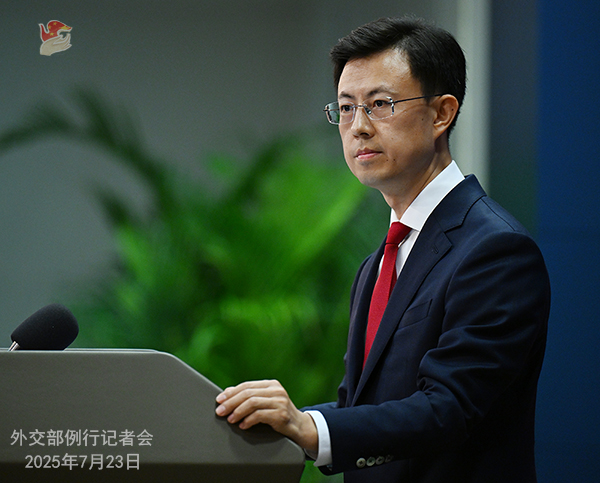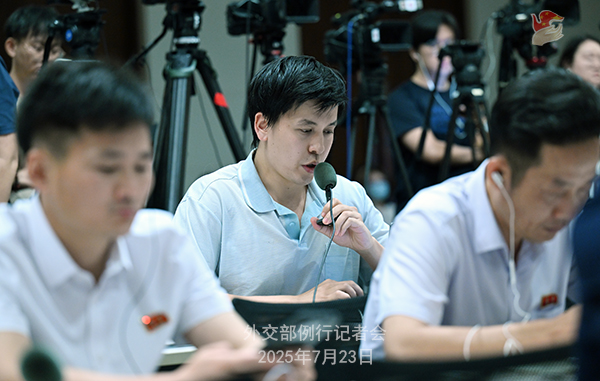
People’s Republic of China


CCTV: A recent report released by the U.S.-China Business Council shows that 82 percent of U.S. companies in China reported profit. Many say uncertainties in China-U.S. relations and tariffs are their top concerns but the Chinese market remains vital. Can I have your comment on that?
Guo Jiakun: Investing in China for a win-win future has become a prevailing consensus among global investors. As of March 2025, there are 1.24 million foreign-funded companies established in China, with a total investment volume of nearly US$3 trillion. While contributing to China’s reform and opening up, these companies have gained opportunities to grow stronger and received considerable return. Data shows that the first half of 2025 witnessed two-digit growth rate in the number of newly established foreign-invested enterprises in China. The third China International Supply Chain Expo wrapped up with the number of participating countries and regions growing from 55 in the first year to 75. The number of U.S. exhibitors is up by 15 percent compared with that of last year, continuing to lead in the number of foreign exhibitors. Over 65 percent of exhibitors were Fortune Global 500 firms or industry leaders. Foreign-funded companies have cast a vote of confidence in China’s economic prospect with their concrete actions.
The Chinese government recently rolled out new steps to encourage foreign investment, showing its sincerity and determination in advancing high-standard opening up. We welcome companies from all countries, including the U.S., to participate in the Chinese modernization drive and strive for greater progress while integrating themselves into high-quality development.
Reuters: U.S. President Donald Trump has struck a trade deal with Japan. It lowers tariffs on auto imports and spares Tokyo new tariffs on other goods in exchange for a US$550 billion package of U.S.-bound investment and loans. What is China’s response to the United States and Japan reaching this trade deal?
Guo Jiakun: China, as always, believes that all parties should solve economic and trade disagreements through equal-footed dialogue and consultation, and uphold a sound environment for international trade and economic cooperation.
TV Tokyo: There are reports that Japanese Prime Minister Ishiba has expressed his intention to resign by the end of August. How does China view this development? Additionally, what impact do you think this will have on China-Japan relations?
Guo Jiakun: This is Japan’s internal affair and I have nothing in particular to say. China and Japan are close neighbors. It serves the fundamental interests of both countries and peoples to maintain the sound and steady development of bilateral relations, make joint effort to comprehensively advance the strategic relationship of mutual benefit and build a constructive and stable China-Japan relationship fit for the new era.
Bloomberg: U.S. Treasury Secretary Scott Bessent said he will meet his Chinese counterparts in Stockholm next week for their third round of trade talks aimed at extending a tariff truce and widening the discussions. He also said the negotiations may take on a broader array of topics, including Beijing’s continued purchase of oil from Russia and Iran. I wonder if you could confirm the dates of the trade talks and comment on whether Beijing is willing to discuss oil purchases from Russia and Iran.
Guo Jiakun: On economic and trade issues, China’s position is consistent and clear. We hope the U.S. will work with China to act on the important common understandings reached by the two presidents in their phone conversation, make good use of the consultation mechanism, and engage in communication and dialogue on the basis of equality, respect and mutual benefit, so that there will be more consensus and cooperation and less misperception, and the bilateral relations can achieve steady, sound and sustainable development. For anything specific, I’d refer you to competent authorities.
Reuters: What is China’s response to President Donald Trump’s announcement that he will be withdrawing the United States from UNESCO?
Guo Jiakun: We noted that UNESCO and multiple countries expressed their regrets over the U.S.’s decision to withdraw from the organization again. It’s the third time that the U.S. has withdrawn from UNESCO. The country hasn’t paid arrears for a long time. This is not what a responsible major country should do. The purpose of UNESCO is to advance international cooperation in education, science and culture, promote the mutual understanding and integration of civilizations, uphold world peace, and achieve common development. China firmly supports UNESCO’s work. On the occasion of the 80th anniversary of the founding of the U.N., we call on all countries to reaffirm their commitment to multilateralism, and take concrete action to support the UN-centered international system, the international order underpinned by international law, and the basic norms governing international relations based on the purposes and principles of the UN Charter.
Reuters: A sweeping cyber espionage operation targeting Microsoft server software has compromised about 100 organizations as of the weekend. It was not clear who was behind the ongoing hack, but Alphabet’s Google said it tied at least some of the hacks to a “China-nexus threat actor.” What is the Foreign Ministry’s response to Google’s description of some of the hacks coming from a “China-nexus threat actor”?
Guo Jiakun: I’m not familiar with the specifics you mentioned. Cybersecurity is a common challenge faced by all countries and should be addressed jointly through dialogue and cooperation. China opposes and fights hacking activities in accordance with the law. At the same time, we oppose smears and attacks against China under the excuse of cybersecurity issues.

Reuters: India said it will resume issuing tourist visas to Chinese citizens from July 24 this year, the first time in five years. What is the Foreign Ministry’s comment on this move?
Guo Jiakun: We take note of this positive move. Easing cross-border travel is widely beneficial. China will maintain communication and consultation with India to further facilitate travel between the two countries.
Bloomberg: Just to follow up on the Microsoft’s accusations. We’re wondering if the Foreign Ministry thinks Microsoft is mistaken. Does China suspect other nations’ state hackers and does Beijing plan to take any action against Microsoft in China as a result of the accusation?
Guo Jiakun: I gave my answer to this question just now. I’m not familiar with the specifics you mentioned. Cybersecurity is a common challenge faced by all countries. All parties need to work together to address cybersecurity issues, instead of using them as an excuse to make accusations and smears on others.
AFP: Iran held a trilateral meeting with China and Russia on Tuesday to discuss the issue of Iran’s nuclear program. So what specific content was discussed at the meeting and what is China’s position on that?
Guo Jiakun: China always calls for a peaceful settlement of the Iranian nuclear issue through political and diplomatic means and maintains communication and coordination with relevant parties. We will continue to play a constructive role and work for the resumption of dialogue and negotiation among relevant parties and a solution that accommodates the legitimate concerns of all parties.
Bloomberg: India and Bangladesh have both expressed concerns over China’s hydropower dam project in Tibet, as have NGOs over concerns to the damage to biodiversity and people’s livelihoods. How does the Foreign Ministry respond to these concerns? We’re also wondering if China has been in touch with neighbors over the construction of the dam and its downstream impacts.
Guo Jiakun: To build the hydropower project in the lower reaches of the Yarlung Zangbo River is fully within China’s sovereignty. The project aims to speed up clean energy development, improve local people’s life, and proactively respond to climate change. China acts with a high sense of responsibility in harnessing cross-border rivers, and has rich experience in hydropower projects. The planning, design and construction of this newly announced project strictly follows the highest national industrial standards. The project puts a lot of emphasis on all-round ecological conservation, stays away from multiple environmentally sensitive areas, and vows to preserve the original ecosystem to the largest extent possible.
The project, once completed, will help prevent and mitigate disasters along the entire Yarlung Zangbo River, and will not adversely affect downstream regions. China is engaged in cooperation with downstream countries on sharing hydrological data, flood prevention and disaster reduction. We have had necessary communication with them on the project, and will continue enhancing cooperation for the benefit of all people along the river basin.
AFP: The U.S. State Department confirmed that an employee of the U.S. government was made subject to an exit ban in China. Could you share more information on that?
Guo Jiakun: I have no details to share. China upholds the rule of law and handles entry and exit affairs in accordance with the law.



